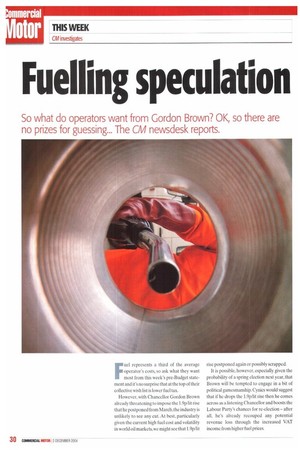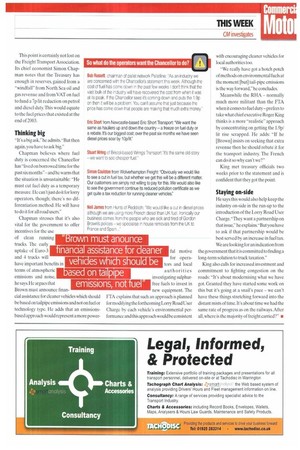Fue ing speculation
Page 30

Page 31

If you've noticed an error in this article please click here to report it so we can fix it.
So what do operators want from Gordon Brown? OK, so there are no prizes for guessing... The CM newsdesk reports.
Fuel represents a third of the average operator's costs, so ask what they want most from this week's pre-Budget statement and it's no surprise that at the top of their collective wish list is lower fuel tax.
However, with Chancellor Gordon Brown already threatening to impose the 1.9p/lit rise that he postponed from March,the industry is unlikely to see any cut. At best, particularly given the current high fuel cost and volatility in world oil markets, we might see that 1.9p/lit rise postponed again or possibly scrapped.
It is possible, however, especially given the probability of a spring election next year, that Brown will be tempted to engage in a bit of political gamesmanship. cynics would suggest that if he drops the 1.9p/lit rise then he comes across as a listening Chancellor and boosts the Labour Party's chances for re-election — after all, he's already recouped any potential revenue loss through the increased VAT income from higher fuel prices. This point is certainly not lost on the Freight Transport Association. Its chief economist Simon Chapman notes that the Treasury has enough in reserves, gained from a "windfall" from North Sea oil and gas revenue and from VAT on fuel to fund a 7p/lit reduction on petrol and diesel duty. This would equate to the fuel prices that existed at the end of 2003.
Thinking big
"It's a big ask," he admits. "But then again, you have to ask big."
Chapman believes where fuel duty is concerned the Chancellor has -lived on borrowed time for the past six months"and he warns that the situation is unsustainable: "He must cut fuel duty as a temporary measure. He can'tjust do it for lorry operators, though; there's no differentiation method. He will have to do it for all road users."
Chapman stresses that it's also vital for the government to offer incentives for the use of clean running trucks. The early uptake of Euro-3 and 4 trucks will have important benefits in terms of atmospheric emissions and noise, he says. He argues that Brown must announce financial assistance for cleaner vehicles which should be based on tailpipe emissions and not on fuel or technology type. He adds that an emissionsbased approach would represent a more power
ases on tai pipe
ful motive for operators and local authorities investigating sulphurfree fuels to invest in new equipment. The FTA explains that such an approach is planned for modifying the forthcoming Lorry Road User Charge by each vehicle's environmental performance and this approach would be consistent ye ices w IC s ou 41 ID
emissions, not ue
with encouraging cleaner vehicles for local authorities too.
"We really have got a hotch potch of methods on environmental fuels at the moment [but] tail-pipe emissions is the way forward," he concludes. Meanwhile the RHA normally much more militant than the FTA when it comes to fuel duty-prefers to take what chief executive Roger King thinks is a more "realistic" approach by concentrating on getting the I.9p/ lit rise scrapped. He adds: "If he [Brown] insists on seeking that extra revenue then he should rebate it for the transport industry. The French can do it so why can't we?"
King met treasury officials two weeks prior to the statement and is confident that they got the point.
Staying on-side
He says this would also help keep the industry on-side in the run-up to the introduction of the Lorry Road User Charge. "They want a partnership on that issue," he explains.-But you have to ask if that partnership would be best served by an increase in fuel tax. We are looking for an indication from the government that it is committed to finding a long-term solution to truck taxation."
King also calls for increased investment and commitment to fighting congestion on the roads: "It's about modernising what we have got. Granted they have started some work on this but it's going at a snail's pace we can't have these things stretching forward into the distant mists of time. It's about time we had the same rate of progress as on the railways. After all, where is the majority of freight carried?" •




















































































































































































